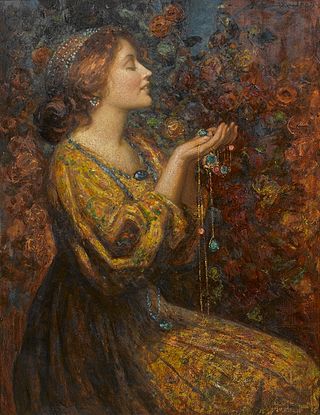 Swedish actress Zelma Hedin (1827–1874) | |
| Gender | Primarily feminine |
|---|---|
| Language(s) | English |
| Origin | |
| Meaning | Variant of Selma |
Zelma is a primarily feminine given name, a variant of the name Selma. [1]
 Swedish actress Zelma Hedin (1827–1874) | |
| Gender | Primarily feminine |
|---|---|
| Language(s) | English |
| Origin | |
| Meaning | Variant of Selma |
Zelma is a primarily feminine given name, a variant of the name Selma. [1]
Zelma was among the 1,000 most popular names in use for girls in the United States between 1880 and 1955. It peaked in 1902, when it was the 216th most popular name for American girls. It was among the top 100 names for girls born in Latvia between 1920 and 1935, and among the top 1,000 names for girls in Brazil between 1950 and 1960. [2]

Cynthia is a feminine given name of Greek origin: Κυνθία, Kynthía, "from Mount Cynthus" on Delos island. The name has been in use in the Anglosphere since the 1600s. There are various spellings for this name, and it can be abbreviated to Cindy, Cyndi, Cyndy, or occasionally to Thea, Tia, or Thia.
Amy is an English feminine given name, the English version of the French Aimée, which means beloved. It was used as a diminutive of the Latin name Amata, a name derived from the passive participle of amare, “to love”. The name has been in use in the Anglosphere since the Middle Ages. It was among the 50 most popular names for girls in England between 1538 and 1700. It was popularized in the 19th century in the Anglosphere by a character in Sir Walter Scott's 1821 novel Kenilworth, which was based on the story of Amy Robsart. Enslaved Black women in the United States prior to the American Civil War were more likely to bear the name than white American women because slave masters often chose their names from literary sources. The name declined in use after 1880 but was revived due to the hit song Once in Love with Amy from the 1948 Broadway musical Where's Charley?. The name peaked in usage in the United States between 1973 and 1976, when it was among the five most popular names for American girls. It remained among the top 250 names for American girls in the early 2020s.
Edith is a feminine given name derived from the Old English word ēad, meaning wealth or prosperity, in combination with the Old English gȳð, meaning strife, and is in common usage in this form in English, German, many Scandinavian languages and Dutch. Its French form is Édith. Contractions and variations of this name include Ditte, Dita, and Edie.

Florence is usually a feminine given name. It is derived from the French version of (Saint) Florentia, a Roman martyr under Diocletian. The Latin florens, florentius means "blossoming", verb floreo, meaning "I blossom / I flower / I flourish". Florence was in the past also used as a translation of the Latin version Florentius, and may be used in this context as a masculine given name.

Dorothy is a female given name. It is the English vernacular form of the Greek Δωροθέα (Dōrothéa) meaning "God's Gift", from δῶρον (dōron), "gift" + θεός (theós), "god".. It has been in use since the 1400s. Although much less common, there are also male equivalents in English such as Dory, from the Greek masculine Δωρόθεος (Dōrótheos). Dorofei is a rarely used Russian male version of the name. The given names Theodore and Theodora are derived from the same two Greek root words as Dorothy, albeit reversed in order.

Molly is a diminutive of the feminine name Mary that, like other English diminutives in use since the Middle Ages, substituted l for r. English surnames such as Moll, Mollett, and Mollison are derived from Molly. Molly has also been used as a diminutive of Margaret and Martha since the 1700s and as an independent name since at least 1720. The name was more popular in the United States than elsewhere in the Anglosphere in the 1800s due to usage by Irish-American families and by Jewish American families who used Molly as an English version of Hebrew names such as Miriam and Malka. Its popularity with Americans was also influenced by stories about Molly Pitcher, a heroine of the American Revolutionary War.

Hazel is a primarily female given name meaning "hazel", from the name of the tree or the color. It is derived from the Old English hæsel. It became a popular name in English-speaking countries during the 19th century, along with other names of plants or trees used for girls.
Helen is a feminine given name derived from the Ancient Greek name Ἑλένη, Helenē, which descends from Proto-Hellenic *Ηwelénā, from a pre-Hellenic or late Proto-Indo-European *Swelénā, ultimately derived from the Indo-European root *swel-.

Amber is a feminine given name taken from amber, the fossilized tree resin that is often used in the making of jewelry. The word can also refer to a yellowish-orange color.

Shirley is a given name and a surname originating from the English place-name Shirley, which is derived from the Old English elements scire ("shire") or scīr and lēah. The name makes reference to the open space where the moot was held. The surname Shirley became established as a female given name in 1849 due to its use in Charlotte Brontë's novel Shirley, in which the character explains that her parents had intended the family surname for a son. It was further popularized in 1851–52 by its pseudonymous use by California Gold Rush writer Louise Amelia Knapp Smith Clappe. It was eventually brought to its highest popularity, in the 1930s, by the fame of child star Shirley Temple.

Ada is a feminine given name. One origin is the Germanic element "adel-" meaning "nobility", for example as part of the names Adelaide and Adeline. The name can also trace to a Hebrew origin, sometimes spelled Adah עָדָה, meaning "adornment". Ada means "first daughter" among the Igbo People. Its equivalent for "first son" in the same clan is Tahitii and Okpara across all Igbo ethnic group in Nigeria. The Igbo people are one of the largest ethnic groups in Africa. Ada means "island" in Turkish, and it was the 35th most popular girls' name in Turkey in 2016. Finally, the name occurs in Greek mythology and was in use in Ancient Greece.

Emma is a feminine given name. It is derived from the Germanic word ermen, meaning "whole" or "universal". It likely originated as a short form of names such as Ermengarde or Ermentrude. Its earliest use begins at least from the early seventh century, with Frankish royal daughter Emma of Austrasia and the wife of Eadbald of Kent found in written sources. Its popularity in the medieval era increased because it was the name of Emma of Normandy, mother of Edward the Confessor. Emmeline is a Norman variant of Emma that was introduced to England by the Norman invaders in the 11th century. The name is etymologically unrelated to Amalia, Amelia, Emilia, and Emily, all of which are derived from other sources, but all of these names have been associated with each other due to their similarity in appearance and sound. Emma has been used as a short form of some of these names or shares diminutives such as Em or Emmy with them.

Ivy is a given name or surname taken from the name of the plant. It became popular as a given name in the late 1800s along with other plant and flower names for girls. As a given name for girls, Ivy first entered the Top 200 in England and Wales in 1880, when it ranked #180, and reached the height of popularity when it was the 16th most popular name in England and Wales in 1904. It has again risen in popularity and, as of 2020, Ivy was the sixth most popular girls' name in England and Wales. It has also risen in popularity in other English speaking countries. It has ranked among the top 50 names for newborn American girls since 2021 and was the 42nd most used name for girls there in 2022. Other botanical names are also currently fashionable, as are other names that contain the letter v.

Blanche is a feminine given name. It means "white" in French, derived from the Late Latin word "blancus". It possibly originated as a nickname or descriptive name for a girl with blonde hair or extremely fair skin. It has been in use since the medieval era, influenced by Blanche of Navarre and her descendants who married into European royal houses.

Ophelia is a feminine given name, probably derived from Ancient Greek ὠφέλεια.

Phyllis or Phillis is a feminine given name of Greek origin meaning foliage. Phyllis is a minor figure in Greek mythology who killed herself in despair when Demophon of Athens did not return to her and who was transformed into an almond tree by the gods. Phillida, Phyllicia, and Phyllida are all variants of the name.

Euphemia, also spelled Eufemia, is a feminine given name of Greek origin meaning "well spoken", from a combination of the Greek word elements eu , meaning "good", and phēmí, "to speak". Several early Christian saints were called Euphemia. The name was in vogue in the Anglosphere during the 1800s and has traditionally been particularly well-used in Scotland.

Jewel is an English given name often given in reference to the English vocabulary word meaning gemstone. The word jewel comes from the Old French word jouel, meaning toy or delight, and was ultimately derived from the Latin term jocus. The name might have originated as an affectionate pet name or been inspired by other gemstone names also in fashion in the Anglosphere during the 19th century. The name is also sometimes a transferred use of the surname Jewel or Jewell, which comes from the Breton surname Judicaël. Some parents might have named their children after John Jewel, a 16th-century Bishop of Salisbury.
Velma is an English feminine given name of uncertain origin. It might have been created as a rhyming variant of the names Selma and Thelma. It might also have been influenced by the Scandinavian name Vilma or by Wilma, both short forms of the Dutch and German Wilhelmina and feminine versions of William.

Elma is a primarily feminine given name of various origins. As an English name, it is considered a feminine version of the name Elmer, or a combination of the names Elizabeth and Mary, a diminutive form of Wilhelmina and various names ending in -elma, or a variant of Alma, Elmira, or Helma.